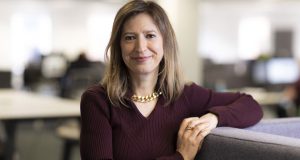Q: How did you progress through the profession to your current role?
I started my career in a front of house role for a well known café in Canberra. I moved there at 17 and needed to pay for my volleyball club fees. Eventually I was asked if I wanted to work in the kitchens as well. I come from foodie roots and I loved customising dishes for people. My stepfamily are from a restaurant background and my father who has a keen interest in farm to table cooking, living on a rural property outside of Sydney.
The café offered me an apprenticeship and I went on to manage the café on weekends while working in the kitchen on weekdays. The café management went on to open an Italian restaurant, making homemade pasta, gnocchi, ciambella doughnuts, the whole works from scratch! I progressed through the restaurant to become chef de partie.
I realised that if I wanted to take this seriously I needed more experience so I moved back to Sydney. There, I applied for jobs and took one with Bel-mondo, a restaurant run by food writer and chef Stefano Manfredi. At the same time I decided to start entering competitions. I did well, getting through to regional and national rounds. There was a particular one, Proud to be a chef, in 2002, where they took junior chefs and helped them to launch their careers. I won that alongside gold, silver and bronze in other cooking competitions. Part of the prize for Bond Land Dairies was a sum of money which, along with my savings, helped me to move to London.
I started at Mosimann’s Club, who were caterers to the Royal family and attracted a lot of celebrities too. I was at the Belfry for a few years. I work on training workshops at the Academy for him and also did international events. Towards the end, I realised I wasn’t making the food that filled my soul. I love the history that comes with food, all the finer details. So I moved on to an Iberian restaurant. I worked with a Michelin-trained chef and he saw my potential so he promoted me to sous chef and immediately started training me. It was great exposure, but after a year I decided to go back to Australia to work with my old boss Stefano Manfredi as senior sous chef. I was there for two years, but missed the UK and being so close to Europe. It was from there I began learning about contract catering and went on to join Vacherin in 2018 as head of food and development.
Q: Do you have any qualifications or training in FM and related areas such as health and safety? And how have you benefited from them?
I’ve completed all the major courses that we’re required to do: Food Safety, and Health and Safety. These courses highlight the things you should already know, but also illustrate things that can go wrong. The courses are delivered in a format that helps make your working environment safer for everyone.
Q: What is your greatest contribution to the FM sector, or your current role?
It’s my innovative approach and my ability to understand what businesses need. I don’t just have a blanket approach. I develop bespoke menus for each site and we get involved with absolutely everything, even right down to the nitty-gritty of the right uniform that suits the clients’ surroundings.
Q: What do you enjoy most about working in FM?
It’s easily the diversity of every day. Each client I work with is completely unique and needs something different. One day you could be offering street food and the next you could be creating a menu that’s really unique and authentic. We’re currently creating a workshop on authenticity and we’re talking to street vendors about their offering. It’s so interesting and I think it’s good for them to be able to share the stories they are so passionate about that then then inspire our chefs.
Q: Do you have future projects or career goals in mind?
I’d like to be able to grow Vacherin. It’s important our chefs have somewhere to progress to, too, so we can retain talent. It would be great if we could bring the Vacherin brand to the high street – that’s something I’d love to see and be a part of.
On a training note, I know quite a few of our chefs also have their own food related business ventures outside of Vacherin so I’d like to bring in a course about small business management to support our chefs in building those platforms. I see my role as a feeder not just in the literal way but also to feed talent, growth, experience and share knowledge.
Q: What personal qualities do you think are most needed for a successful career in FM?
I think it’s a can-do attitude. There are curve balls thrown at you all the time, so you need to be flexible and willing to try things. You also need to be prepared to evolve as a chef. My father once said ‘if you don’t evolve, you get left behind’ so I think evolving is the real secret to success in the catering industry and you need to be independently driven for that.
Q: What do you think would make the biggest difference to catering the FM sector?
I think there’s a need for a greater focus on corporate social responsibility and that will make a huge difference to the way the sector operates. All chefs need to know how to utilise ingredients to their full potential to reduce food waste. Reducing plastics waste is also key. Vacherin has started using glass jam jars to reduce plastic waste. The idea is that customers return them after each use so they can be washed and re-used. More catering companies need to be zero waste to landfill and it’s really important partners, suppliers and clients support each other in that.
Q: What advice would you give to someone coming into the profession now?
Don’t wait for someone to teach you. If you’ve got a question, you need to answer it yourself. Just go out and find the information. Whatever anyone else brings to the table is just a bonus.
Q: What are the greatest challenges of working in FM?
Understanding how to get to the most from people. With multiple clients, everyone has a different objective. You need to understand what your own staff need to be able to fulfil their role, as well as understanding what they need to deliver to their clients. You have to grasp the bigger picture from the beginning.
Q: What do you predict could be the main changes to the FM sector over the next few years?
I think we will see a greater focus on flexible working, CSR, and the whole wellbeing aspect in general. Recruitment will also be a key focus as younger people work differently and often like to work under their own conditions. This isn’t always a good fit for the traditional catering industry so we need to reevaluate things and evolve recruitment strategies in order to attract and retain talent.
Workplaces are also evolving and restaurants are now becoming meeting spaces, too, so there’s a demand for food service that lasts the whole day rather than just at designated meal times.




